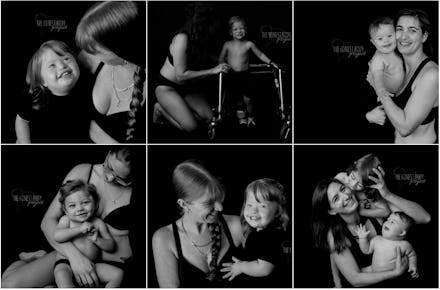This Gorgeous Photo Series Shows What It's Like to Be the Mom of a Child With Disabilities

A Florida photographer is shining a light on mothers of children with special needs — and the results are powerful.
Natalie McCain, creator of the Honest Body Project, photographed six women with their children, all of whom have special needs ranging from autism to cerebral palsy.
"The portraits show their joy, their beauty, their imperfections and their love for their children," McCain writes on her website. "Paired with their stories, it paints a beautiful, honest picture of motherhood."
Making these stories known: The Honest Body Project is a part-photography, part-storytelling project aimed at fighting body-shaming. Previous projects featured mothers breastfeeding, as well as new moms baring their C-section scars.
The latest installment, "Defined by Our Hearts," highlights the experiences of mothers raising children with special needs while making the point that "children with special needs are so much more than their disabilities," McCain writes.
"I chose to do a series on mothers with children who have special needs because I want to help reach other mothers who can relate," she told Mic. "There are so many women struggling with this, especially after first getting a diagnosis. I hope it also helps mothers, whose children are typically developing, to start conversations with their children on how amazing these kids are and to be more understanding."
According to the United States Census Bureau, nearly 3 million U.S. kids have a disability of some kind, or more than 5% of all school-aged (5 to 17 years old) children. While the stories of the mothers in these photos are not often represented in the mainstream, the project proves that they're anything but uncommon.
"These kids have a place in this world too, and we as parents need to help our non-special needs kids to be accepting of everyone," the mother of a child with autism writes. "Also, don't tell your kids to be quiet when they see someone with a disability and have questions. I would rather people ask us why Bethany has braces, rather than telling their kids to be quiet and stop staring. It causes kids to stare more and makes Bethany uncomfortable."
This kind of visual storytelling can have a powerful effect, both in increasing visibility and making parents of children with special needs feel less alone.
As one of the mothers featured in the project writes, the sense of community among parents was what helped her family come to terms with her son's Down syndrome diagnosis.
"I joined multiple support sites where everyone shared the same fears I had. The same stories," she writes. "And then I realized it was going to be okay."
You can check out more of McCain's Honest Body Project here.
h/t The Daily Mail